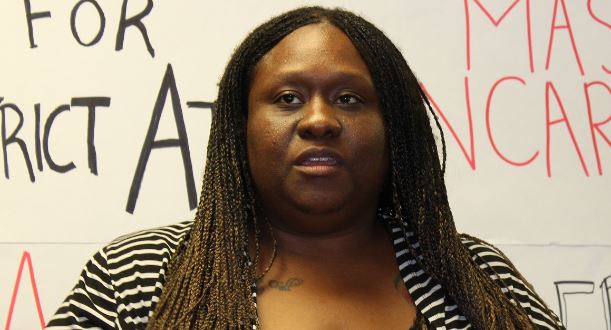Leslie Turner was arrested in 2016 when her son was four months old. Her crime: Failure to make a payment for a traffic ticket.
In Nevada, traffic violations are treated as a criminal infraction, meaning missing a payment is seen as a failure to appear in court, rendering the person who got the ticket subject to a bench warrant and arrest.
Thirty-seven states across the country consider these violations civil matters that do not lead to jail time.
Nevada is not one of them.
“This was my first child,” Turner said. “It was very difficult bringing him into the world.”
Turner’s son was born two months premature resulting in complications after his birth. He was diagnosed with Clonus, a condition that results in involuntary muscle spasms sometimes caused by an underdeveloped nervous system.
“He would just shake, shake, shake,” Turner said. “He was so small. The thought of having to leave him alone was just really scary.”
With the help of her mother and Clark County Social Services she was able to postpone her return to work for a few months and keep up payments on her rent.
But payments for her traffic tickets continued to follow her until she could no longer keep up. After missing a payment Turner called the court in an attempt to explain her situation but was told she would either have to attend court or turn herself in.
Nevada law does not provide a grace period for individuals on payment plans, and people who miss a payment can be arrested, even if past payments were made on time. The practice disproportionately affects poor people.
“I just didn’t pay it because I didn’t have the money,” Turner said.
Fearing arrest, Turner returned to work despite her son’s condition in order to have some income to get back on her payment plan. One day, after dropping her child off with a babysitter she was pulled over and taken to jail.
“The messed up thing was I was breastfeeding. They didn’t care,” Turner said. “They gave me Tylenol. That’s all they did.”
According to records, the North Las Vegas Municipal Court served 10,584 arrest warrants during the 2017 fiscal year. Of 18,057 total cases filed, 13,804 were for traffic and parking, and 4,253 for misdemeanors. That means that even in the unlikely event every misdemeanor had resulted in an arrest warrant, still more than half of the arrest warrants would have been associated with traffic and parking tickets.
Turner was arrested on a Wednesday in the late evening and kept in holding until Monday the following week. Her bail was set at $1,500, more than she earned in a month.
The function of bail is to prevent people from evading their obligation to go to court and to protect potentially dangerous people from causing harm before their cases are decided. But in Nevada’s system of pretrial detention, minor offenses like the failure to pay parking tickets can keep people in jail for days, if not months, at taxpayer expense.
Turner now works for PLAN Action’s mass liberation campaign, which works to end mass incarceration and holds fundraising events to help make bail for those who cannot pay it themselves.
Last year the Legislature appointed an interim committee to study the feasibility of decriminalizing traffic tickets. The report will be submitted to the Legislature in 2019. In the meantime, people who can’t afford bail for traffic tickets, sit in jail.
“The problem is that judges here, quite truthfully, don’t care,” said Thomas Pitaro, an attorney who has been practicing law in Las Vegas for more than 40 years. “They will look at you with a straight face and set a half a million dollar bail.”
In 2013, District Judge Doug Smith, who is still a seated judge, was removed from a case by the Nevada Supreme Court for setting a defendant’s bail at $1 million after leaving the defendant, Juan Delgado Perez, in jail for fifteen days without bail in order to punish him for having an “attitude” during court.
“An attitude like that, you can sit in jail,” said Smith, according to transcripts.
Bail should not be more than the accused can reasonably be expected to pay under their circumstances, according to Nevada law, but many judges still impose high bail on those who cannot afford it.
Assemblyman Osvaldo Fumo argues that unreasonably high bail is “tantamount to no bail at all” and a violation of the Nevada constitution.
“You get a judge who says ‘I can put a $500 bail on someone’ which is basically saying if you’re rich I can see to getting you out but if you’re poor you’re going to stay,” Fumo said.
Fumo says those who can’t afford bail are stuck in jail where they can lose their jobs and are kept from their children, all before even being convicted of a crime.
In the last legislative session Assemblywoman Dina Neal drafted a bill which required courts to consider non-monetary means of getting people to appear for court. In the end the bill was vetoed by Governor Brian Sandoval.
Although Fumo worked on the bill alongside Neal, he felt it didn’t go far enough in giving judges direction when imposing bail.
Opposition to Nevada’s cash bail system is growing in Clark County. Robert Langford, who is challenging incumbent District Attorney Steve Wolfson in next week’s Democratic primary, has promised to reform the bail system should he win.
Nevada’s bail system disproportionately affects the poor and minorities, Langford said.
“You have to have someone at the top that understands that racism is a real thing, and until we accept that we can’t change that,” Langford said.
North Las Vegas – a city with a high rate of poverty and high concentration of minority communities – collected $5.7 million in fines, fees, and assessments out of the $7.2 million originally imposed by its municipal court in fiscal 2017.
Judicial expenses in North Las Vegas for 2017 were about $6 million, revealing that the municipal court is entirely self-funded by the fines, fees, and assessments it imposes.
Nevada courts and law enforcement are not required to collect demographic information on who passes through the court system. Additionally, law enforcement does not maintain demographic information on those with a bench warrant as a result of the inability to pay, who is being held in jail as a result of inability to pay and for how long, and who is being stopped and for what violations.
This lack of record keeping makes it nearly impossible to monitor impact based on race, color, disability, or other federally protected categories – a practice Langford plans to end with greater transparency in the criminal justice system.
“If we are going to be the party that does good things for the community we have to solve problems. That includes bail,” said Langford.
Wolfson, meantime, said that steps are already to address problems associated with cash bail, citing a new risk assessment process that has been in use for the last six months.
“It looks at if a person in custody, and if they are a violent offender or have a likelihood of not appearing in court,” Wolfson said. “Prior to this we were doing it the old way, that if you didn’t get released on your own recognizance, bail was set.”
No bail is set until the risk assessment is completed and reviewed, which can delay someone’s release from pretrial holding. Judges are not bound to honor risk assessments.
Our stories may be republished online or in print under Creative Commons license CC BY-NC-ND 4.0. We ask that you edit only for style or to shorten, provide proper attribution and link to our website. AP and Getty images may not be republished. Please see our republishing guidelines for use of any other photos and graphics.




